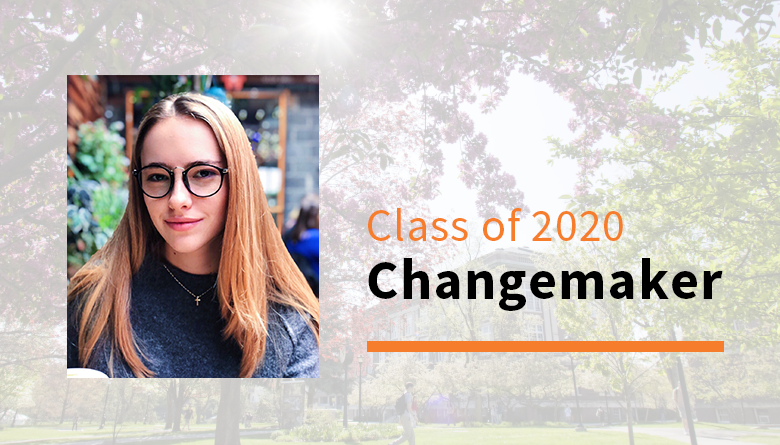On a sunny day late last September, Ana Gabriela Duque walked through a field in between rows of large straw-like bales of industrial hemp. The bright green plants, which had already been harvested at this point, were the focus of her undergraduate research project at Rensselaer Polytechnic Institute on the environmental merits of using this material for clothing.
She was invited to visit the farm by a local hemp farmer who was interested in her research.
“It gave me more perspective,” Duque said of the visit. “It actually helped me a lot in understanding the whole process.”
Duque, who will graduate in May with a degree in industrial and management engineering, became interested in the environmental impacts of the clothing industry after a summer internship at a small, high-end fashion design brand in Colombia, where she was born and raised.
“One of the things I noticed was a lot of waste during the whole production process,” Duque said. “It sparked my interest in looking into more data concerning the fashion industry.”
What she learned was that — based on the amount of water used, carbon emitted, and pesticides sprayed during plant and garment production — the textile industry is among the most polluting in the world. Industrial hemp, she said, could significantly reduce the industry’s footprint by reducing water and pesticide use, the amount of land needed for plant growth, and carbon emissions.
Duque not only dug into the data herself, but also shared it with whomever she could. She earned a first place poster presentation award at the Rensselaer Annual Undergraduate Research Symposium, presented her research at the INFORMS annual conference in 2019, and successfully submitted her findings for publication. Duque and her advisers recently produced this video to explain her work.
Time after time, Duque said, she met misconceptions about hemp with data and information rooted in centuries of hemp textile use. The more she explained, the more interest from others grew. “I think it shines a light on the fact that knowledge is really powerful,” Duque said.
Duque has always been acutely aware of the world around her and found ways to harness information to improve the lives of others.
As a child, Duque volunteered with her family for an organization in Colombia that provides free health care through medical missions. When she got older, she worked with her family to found another effort to increase the impact of their work.
“As a family, we started an organization, Little Hands Across the Americas, which kind of supported that bigger volunteer organization,” Duque said. “It started off with something small, like bake sales when I was very young, and then it just kept growing and we were able to provide meals to children.”
While at Rensselaer, Duque found meaning in feeding others a warm meal on cold winter nights in upstate New York. For two days each week, she volunteered her time with the Salvation Army, serving dinner out of a mobile food truck.
“Volunteering has always been a passion of mine,” Duque said.
As she served, she also brainstormed how facts and figures could help here, too. She worked with the organization to build a system that would allow the Salvation Army to track data about the meals it serves in a more efficient way.
“For me, industrial engineering fit a lot with my personality,” Duque said. “Industrial engineering is actually about building a proper path for something: What is the best, most efficient way to go from point A, or state A, to point B?”
During her time at Rensselaer, Duque was also a member of the Women at Rensselaer Mentor Program, the Society of Women Engineers, the engineering honor society Tau Beta Pi, and the industrial engineering honor society Alpha Pi Mu. She recently became the 2020 recipient of the Class of 1957 Spectrum Award in recognition of her service to the Rensselaer community and her academic success.
Duque has accepted a position with Deloitte Consulting. She looks forward to combining her interests and strengths in data, data science, and technology to support improvements in the way people work and live — leaning on a lesson she learned, in part, on that industrial hemp farm.
“I was able to learn that, although it’s such a big issue, you can tackle one aspect of it and you can make a big difference,” Duque said.


